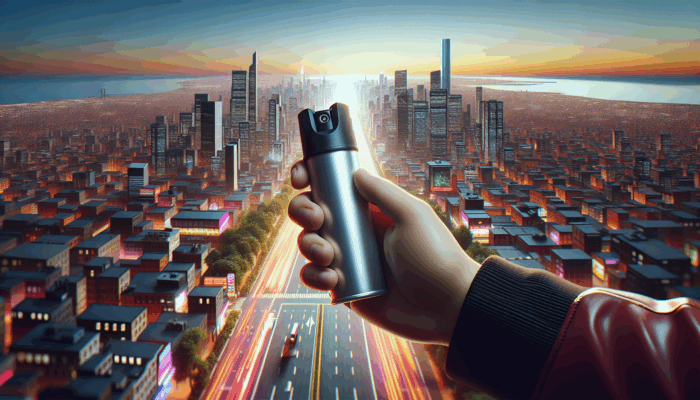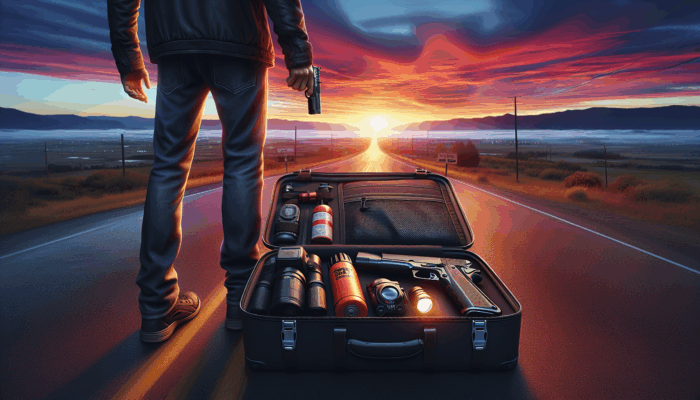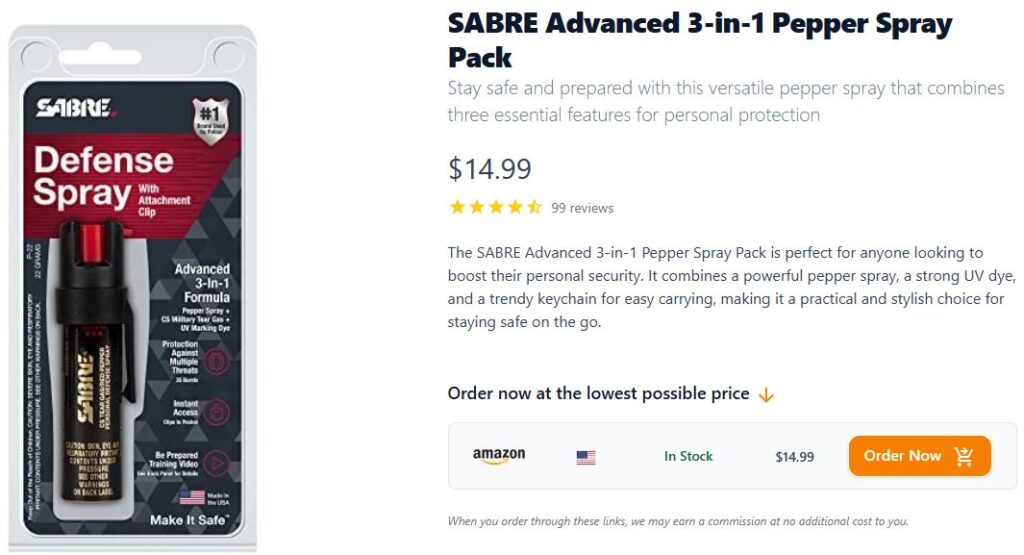Effective Strategies for Selecting the Best Self-Defense Tools for Your Journey
Selecting the proper self-defense tools for road trips ensures your safety and well-being while traveling. The unpredictable nature of the open road necessitates having trustworthy self-defense options that can provide you with peace of mind. The appropriate tools empower you and bolster your preparedness for potential dangers. Here are three essential self-defense tools that every traveler should prioritize when preparing for their journey.
Maximize Your Safety with Pepper Spray

Among the compact and practical self-defense options, pepper spray is widely considered a top choice for travelers. This small yet powerful canister is easy to carry and can deliver a potent deterrent against would-be attackers. The active component in pepper spray, capsaicin, induces intense irritation to the eyes and respiratory system, temporarily incapacitating an assailant. Its compact nature makes pepper spray an ideal choice for anyone embarking on a road trip, as it can seamlessly fit into a purse or glove compartment for quick access.
When selecting a pepper spray product, prioritize those designed for self-defense rather than those intended for animal control. Opt for models featuring an adjustable nozzle that allows for various spray patterns and a safety lock to prevent accidental discharge. Additionally, familiarize yourself with the effective range of your chosen product—most sprays can reach distances of 10 to 20 feet, providing an essential buffer between you and potential threats.
Understanding local regulations concerning pepper spray is of utmost importance. Some states impose restrictions on the size or formulation of pepper spray, while others may require permits for lawful possession. Educating yourself on these laws before hitting the road is crucial for avoiding legal complications.
Enhance Your Security with Stun Guns
Stun guns provide a valuable non-lethal self-defense option, giving travelers an additional layer of security. These devices deliver a high-voltage shock to an attacker, temporarily incapacitating them and allowing you to escape danger. Unlike firearms, stun guns are explicitly designed to immobilize rather than inflict permanent harm, making them an appealing choice for individuals who prioritize non-violent self-defense methods.
Various stun gun models are available on the market, ranging from compact handheld versions to more robust units equipped with built-in flashlights or alarms. When choosing a stun gun, consider its voltage and additional features. A stun gun with a minimum of 1 million volts is typically adequate for deterring an assailant. Furthermore, look for rechargeable models that include a safety switch to prevent unintentional shocks.
Verifying state and local laws is essential before traveling with a stun gun. Certain states have restrictions or outright bans on stun guns, while others have specific guidelines. Being well-informed about the legal landscape ensures you remain compliant and safe throughout your journey.
Utilize Personal Alarms for Added Safety
Personal alarms serve as straightforward yet highly effective self-defense tools for travelers. When activated, these devices emit an alarm that can exceed 120 decibels, deterring potential attackers and alerting those nearby to your predicament. The loudness of a personal alarm can attract attention and potentially scare off an assailant, providing you with a crucial opportunity to escape any threatening situation.
Many personal alarms are compact, lightweight, and easily attachable to keychains, making them readily accessible when needed. Some models even come equipped with additional features, such as built-in LED lights for better visibility at night. It is advisable to periodically test your alarm to ensure it functions correctly and to become familiar with how to activate it quickly in emergencies.
While personal alarms should not replace physical self-defense tools, they can complement your travel safety toolkit. These devices can be particularly effective in crowded areas, where the alarm can cut through the noise and attract help. As with other self-defense tools, it is wise to understand local regulations regarding personal alarms before utilizing them in public spaces.
Navigate the Legal Landscape of Self-Defense Tools with Confidence

Understanding the legal landscape surrounding self-defense tools for road trips is crucial for all travelers. Laws governing self-defense can differ significantly from state to state, and being aware of these differences can help you avoid unnecessary legal complications. Here’s what you need to know to navigate self-defense laws during your travels effectively.
Understanding State Laws Regarding Self-Defense
Each state has its unique set of self-defense laws, which dictate what self-defense tools you can carry and the circumstances under which you may use them. Some states adopt a “stand your ground” law, allowing individuals to use force without the duty to retreat when they perceive a threat. Conversely, other states may enforce a “duty to retreat” requirement, necessitating an attempt to escape before employing force.
Researching the self-defense laws of the states you plan to visit is essential. Resources like” the National C” inference of State Legislatures (NCSL) provide comprehensive information detailing self-defense laws in each state. Additionally, understanding how these laws apply to your specific self-defense tools—such as pepper spray or stun guns—can help you remain compliant and safe.
Bear in mind that carrying legal tools in your home state does not guarantee they are permitted in another state. For instance, while pepper spray may be legal in one state, there could be restrictions on its size or formulation in another. Always double-check local regulations and contact local law enforcement agencies to clarify any uncertainties before embarking on your trip.
Concealed Carry Permits: Know the Requirements
If you carry a firearm for self-defense during your road trip, obtaining the appropriate concealed carry permit is crucial. Each state has different requirements and laws governing concealed carry, and failing to comply can result in serious legal consequences.
Before embarking on your journey, ensure your concealed carry permit is valid in the states where you plan to travel. The Association of County Commissions of Alabama provides a helpful guide to understanding reciprocity agreements between states, allowing concealed carry permits to be recognized across state lines.
In addition to obtaining necessary permits, familiarize yourself with regulations governing where to carry your firearm legally. Specific locations, such as schools, government buildings, and private properties, may prohibit firearms, and it’s vital to respect these laws to avoid legal troubles.
Permissible Use of Force: What You Need to Know
Understanding the acceptable use of force in self-defense is essential for any traveler. The laws surrounding the use of force can be intricate, often hinging on the specifics of the incident. Generally, individuals are permitted to use reasonable force in self-defense; however, the definition of “reasonable” can vary significantly based on situational factors and state laws.
In most jurisdictions, the use of deadly force is only justified when you believe your life is in imminent danger. Conversely, deploying non-lethal tools like pepper spray or stun guns is typically viewed as permissible, provided that the level of force used is proportional to the threat faced. Always aim to de-escalate a situation and prioritize escape whenever possible.
Understanding when and how much force you can legally employ can help you navigate potentially dangerous situations without legal repercussions. Consider consulting legal resources or professionals specializing in self-defense law to ensure your knowledge is accurate and up-to-date.
Enhance Your Safety Through Training and Preparedness
Equipping yourself with the necessary knowledge and skills is just as crucial as having the right road trip self-defense tools. Engaging in training and preparation not only boosts your confidence but also ensures that you can effectively utilize your self-defense tools when necessary. Here’s how you can prepare for any situation you may encounter.
Enroll in Self-Defense Classes for Practical Skills
Participating in self-defense classes is an excellent way to acquire practical skills to protect yourself during travel. Many courses focus on techniques that empower individuals to defend themselves against physical threats, emphasizing practical techniques and situational awareness. Programs such as Krav Maga, Brazilian Jiu-Jitsu, and even introductory self-defense courses can provide invaluable training.
Seek out classes tailored explicitly for real-world scenarios. This training often incorporates methods for recognizing potential threats, employing de-escalation techniques, and practical exercises utilizing self-defense tools like pepper spray and stun guns. Numerous self-defense schools also offer workshops designed for travelers, addressing common scenarios that may arise on the road.
Regardless of your skill level, participating in self-defense training can significantly boost your confidence and equip you with the knowledge necessary to respond calmly and effectively in stressful situations. Moreover, the camaraderie built within these classes can create a supportive network of peers who share your interest in travel safety.
Regular Practice with Self-Defense Tools
Regular practice is paramount for mastering the application beyond merely understanding how to use self-defense tools. Proficiency in utilizing items like pepper spray or stun guns can dramatically increase your chances of effectively defending yourself in emergencies. Dedicate time to practice deploying and using your self-defense tools in controlled environments, such as your home or designated training locations.
Consider organizing practice sessions with friends or family to simulate real-world scenarios. Practicing under stress can help condition your reflexes and improve your response times. You may also utilize video resources or attend refresher courses to keep your skills sharp as you prepare for your trip.
Moreover, developing situational awareness is equally critical. This entails being conscious of your surroundings and recognizing signs of trouble before they escalate. Engage in exercises aimed at enhancing your ability to assess environments quickly, such as identifying escape routes or observing the behavior of individuals nearby.
Master the Art of Situational Awareness
Cultivating situational awareness is one of the most effective strategies for preventing dangerous situations during your road trip. This personal safety skill involves being cognizant of your surroundings, identifying potential threats, and responding appropriately. Effective situational awareness can help you avoid conflicts and maintain safety on the road.
Begin by actively observing your environment as you travel. Note the people around you, the area’s layout, and any unusual behavior. If something feels off, trust your instincts and consider leaving the area. Situational awareness is about being proactive rather than reactive. The goal is to identify potential threats before they manifest.
Additionally, being informed about common scams or criminal tactics can enhance safety. Research local crime trends in the areas you plan to visit, and equip yourself with knowledge on recognizing these threats. The more informed you are, the better prepared you’ll be to respond effectively if something goes awry.
Implement Comprehensive Vehicle Security Measures
Your vehicle serves as your mobile haven during a road trip, making vehicle security an essential part of ensuring your safety and protecting your belongings. Effective vehicle security measures can help deter potential thieves and provide a smooth, worry-free travel experience. Here are several strategies you should consider.
Enhance Security with Reliable Locking Mechanisms
Reliable locking mechanisms are your first line of defense against unauthorized access to your vehicle. Before hitting the road, ensure your car’s locks function correctly and consider upgrading to high-security locks if necessary. These enhanced locks can deter potential thieves and provide additional security. Modern vehicles come equipped with advanced locking systems, such as keyless entry and immobilizers, making it more challenging for criminals to gain access. However, even older model vehicles can benefit from upgraded steering wheel locks, discouraging theft attempts. Always double-check that your doors are locked before leaving your vehicle unattended, particularly in unfamiliar areas.
Additionally, consider investing in window security film, which can make it more difficult for thieves to break into your car. This added barrier can deter opportunistic theft. Remember, the goal is to make your vehicle as unattractive and difficult to access as possible for potential thieves.
Install Alarm Systems for Enhanced Protection
Installing an alarm system in your vehicle can be a powerful deterrent against theft. Many alarm systems are designed to alert you and those nearby if someone attempts to break into your car. These systems typically include motion sensors, glass break detectors, and loud sirens that activate when triggered.
When selecting an alarm system, look for one that offers remote notifications to your smartphone. This feature allows you to monitor your vehicle’s security while away, providing peace of mind during your travels. Some alarm systems even integrate with GPS tracking, enabling you to locate your vehicle if it is stolen.
Maintenance of your alarm system is crucial to ensure its reliability. Test the system frequently to confirm that it functions correctly and replace batteries as needed. Keeping your alarm in optimal condition will enhance your vehicle’s overall security throughout your road trip.
Utilize GPS Tracking for Quick Recovery
If your vehicle is stolen, having a GPS tracking device can significantly increase the likelihood of recovery. These devices provide real-time location information, allowing law enforcement to track your vehicle’s movements. Many modern vehicles come equipped with built-in GPS tracking, while aftermarket options are also available for those with older models.
When selecting a GPS tracking device, choose one with features like geofencing that alerts you if your vehicle leaves a predetermined area. This functionality is especially useful in high-crime areas where theft is more likely. Additionally, ensure that your tracking service is reliable and provides consistent updates.
While GPS tracking can enhance vehicle recovery efforts, it is important to combine this security measure with others, such as alarm systems and physical locks. The more layers of security you have in place, the more difficult it is for thieves to succeed.
Incorporate Immobilizer Systems for Added Security
An immobilizer system effectively prevents vehicle theft by disabling the engine unless the correct key or fob is used. Many newer vehicles have built-in immobilizer systems, while older cars may benefit from aftermarket installations. This technology adds a layer of security, making it significantly more challenging for thieves to start your vehicle.
When exploring immobilizer systems, consider options that integrate seamlessly with your existing security features. Some systems can even be programmed to alert you when an unauthorized key attempts to start the engine. This feature can provide an early warning of potential theft attempts.
As with any security measure, ensure your immobilizer system is regularly tested and maintained. Keeping your vehicle’s security features in good working order is vital for optimal travel protection.
Select Secure Parking Locations for Enhanced Safety
Choosing the right parking vehicles during your road trip can significantly reduce the risk of vehicle theft or break-ins. Aim to park in well-lit, populated areas, preferably with security cameras or personnel. This heightened visibility can deter criminals from targeting your vehicle.
Whenever possible, utilize parking garages or lots that offer monitored security. Many urban areas feature paid parking facilities that include security guards or surveillance systems, providing an added layer of safety. Always trust your instincts when evaluating a parking area—if it feels unsafe or secluded, consider finding another spot.
Additionally, be aware of local crime trends when selecting parking locations. Research areas with a reputation for vehicle thefts and avoid them whenever possible. Strategically choosing where to park can significantly enhance your vehicle’s security during your trip.
Stay Connected with Essential Emergency Communication Devices
Maintaining connectivity during your road trip is crucial for safety, especially in rural areas where cell service may be unreliable. Having the right emergency communication devices can significantly impact critical situations. Below are some essential tools to consider incorporating into your travel plans.
Utilize Satellite Phones for Reliable Communication
Satellite phones can be invaluable for travelers venturing into remote regions where cell service is minimal or nonexistent. These devices utilize satellite technology to maintain communication regardless of location, enabling you to call for help or stay in touch with loved ones off the grid.
When selecting a satellite phone, consider factors such as battery life, coverage area, and usage costs. Some satellite phone providers offer affordable rental options for specific trips, making this a cost-effective solution for short journeys.
Familiarizing yourself with the operation of your satellite phone before your trip is critical. Practice making calls and sending messages to ensure you are comfortable using the device in emergencies. Being prepared can be the difference between a minor inconvenience and a life-threatening situation.
Enhance Group Communication with Two-Way Radios
Two-way radios are an excellent option for keeping in touch with travel companions, especially in areas where cell phone reception is poor. These devices provide instant communication without relying on cellular networks, making them ideal for group travel or off-road adventures.
When selecting two-way radios, consider range, durability, and battery life factors. Many models offer features like weatherproofing or emergency channels, enhancing their utility in various conditions. Additionally, investing in rechargeable batteries ensures that your devices are always ready for use.
Two-way radios can also serve as practical tools for emergency communication. In an emergency, having direct communication with your travel group can facilitate quick decision-making and enhance overall safety.
Leverage Smartphone Apps for Emergency Preparedness
In today’s digital age, utilizing smartphone apps specifically designed for emergency communication can significantly improve safety during your road trip. Apps like Life360 allow users to share their location with family and friends, providing real-time updates on their whereabouts.
Certain apps also feature emergency capabilities, such as one-touch alerts that notify contacts in case of danger. Other applications can provide easy access to local emergency services and hospitals, ensuring that assistance is just a few taps away.
It’s essential to ensure that your smartphone is fully charged and to download these apps before your trip. Consider carrying a portable charger to keep your device powered for emergencies. Preparing with the right apps can enhance your peace of mind while traveling.
Personal Locator Beacons: Your Lifeline in Remote Areas
Personal locator beacons (PLBs) are crucial for anyone traveling in remote areas where help may not be readily available. These devices send distress signals to emergency services, alerting them to your location in an emergency.
When selecting a PLB, look for compact, waterproof models with long battery life. Many modern beacons also feature GPS tracking, which significantly expedites rescue operations.
Understanding how to operate your PLB is essential. Practice activating it in a controlled environment to familiarize yourself with its functionality. In a crisis, knowing how to use your device can save valuable time and potentially save lives.
Utilize GPS Messengers for Enhanced Communication
GPS messengers are another excellent option for improving emergency communication during road trips. These devices enable users to send and receive messages, share their location, and communicate with others, even outside of cellular range.
Many GPS messengers have features like location tracking and preset emergency messages that can be easily sent to contacts. These tools can be particularly beneficial when traveling in remote areas where traditional communication methods may fail.
As with other communication devices, familiarize yourself with your GPS messenger’s operation before your trip. Practice sending messages and sharing your location to ensure you’re comfortable using it during emergencies.
Be Prepared: Essential First Aid Messenger’s Preparedness
Medical preparedness is another critical aspect of ensuring safety during your trip. Being equipped with the right supplies and knowledge can make a significant difference in emergencies. Here’s how you can prepare yourself medically for your journey.
Assemble a Comprehensive First Aid Kit
A well-stocked first aid kit is an essential item for any road trip. Your kit should include vital items such as adhesive bandages, antiseptic wipes, gauze, pain relievers, and any personal medications you or your travel companions may require.
When assembling your first aid kit, consider your group’s specific needs. If traveling with children or pets, ensure you have supplies suitable for their care. Including items like a digital thermometer, tweezers, and scissors can be beneficial for managing various first aid situations.
Regularly check your first aid kit to ensure supplies are not expired and replace items as needed. Familiarize yourself with the contents of your kit so that you can quickly locate what you need in an emergency, ensuring a swift response when it matters most.
Gain Basic Medical Training for Emergencies
Basic medical training can empower you to respond effectively to emergencies while traveling. Consider enrolling in a first aid and CPR course, which can equip you with vital skills for managing injuries or medical emergencies until professional help arrives.
Many organizations, such as the American Red Cross, offer classes tailored for travelers and outdoor enthusiasts. These courses generally cover wound care, choking response, and recognizing and responding to medical emergencies.
In addition to formal training, regularly reviewing first aid guidelines and refreshers can be immensely beneficial. Keeping a first aid manual or easy access to online resources can ensure you stay informed about best practices in medical emergencies.
Carry Necessary Medications and Proper Storage Techniques
When embarking on a road trip, it is essential to carry all necessary medications and know how to store them properly. Ensure you bring an adequate supply for your journey and a copy of your prescriptions if needed.
Consider the climate of the areas you travel through, as extreme temperatures can affect certain medications’ efficacy. For instance, some medicines may require refrigeration, while others should be kept away from heat sources.
It’s also advisable to maintain medications in their containers to avoid confusion. A list of your drugs and their dosages can be helpful in an emergency, especially if you need medical assistance.
Maintain Updated Emergency Contact Information
Keeping an updated list of emergency contacts is critical in ensuring your safety during a road trip. This list should include local hospitals, nearby urgent care facilities, and your insurance provider’s contact information.
Store this information in a readily accessible location, such as your first aid kit or on your phone. Sharing these contacts with your travel companion ensures that everyone is informed about vital resources in case of emergencies.
Additionally, consider informing a trusted friend or family member of your travel itinerary. Regular check-ins can help ensure someone is aware of your whereabouts, acting as an additional layer of safety during your journey.
Plan for Medical Evacuations: Be Prepared
Understanding the procedures for medical evacuation is critical, especially when traveling in remote areas where help may be far away. Familiarize yourself with the protocols for contacting emergency services and the costs associated with medical evacuations.
Researching local hospitals and clinics before your trip can provide insight into the medical services available in the areas you will visit. Some travel insurance plans include medical evacuation coverage, which can alleviate financial stress during emergencies.
Having a clear plan to facilitate a safe and timely evacuation can significantly affect outcomes in severe injury or illness. Discuss potential medical evacuation scenarios with your travel companions, ensuring everyone understands their role in case of an emergency.
Strategic Planning and Route Safety for Your Journey
Effective planning and route safety measures can minimize potential risks during your road trip. By being strategic about your travel plans, you can avoid high-crime areas and ensure a safer journey. Here’s how to enhance your trip safety through careful planning.
Thorough Route Planning: Avoid Dangerous Areas
Thorough route planning is essential for avoiding dangerous areas during travel. Utilize mapping tools and apps to identify safe routes, and consider checking local crime statistics for the regions you’ll be traversing.
Planning your stops, including rest breaks and overnight accommodations, can also contribute to a safer journey. Avoid driving through less populated areas at night and prioritize well-lit, populated locations for breaks. Steering clear of high-crime areas or regions with a reputation for dangerous situations can significantly enhance your journey’s safety.
Stay flexible with your travel plans, allowing for adjustments if necessary. If you encounter an unsafe area or your instincts suggest a problem, don’t hesitate to change your route or take an alternate path to ensure your safety.
Choose Safe Rest Stops to Minimize Risks
Selecting the proper rest stops during your road trip can significantly reduce risks. Opt for well-lit, busy rest areas with security personnel or surveillance. These locations are typically safer than isolated spots, especially when visibility is low at night.
When taking breaks, remain vigilant and aware of your surroundings. Pay attention to the behavior of others in the area, trusting your instincts—if something feels off, consider moving on to a different location.
Additionally, at rest stops, keep your belongings secure and within view. Avoid leaving valuables in plain sight inside your vehicle, which can attract thieves. Taking simple precautions can enhance your safety during breaks and ensure a more enjoyable travel experience.
Maintain a List of Emergency Contacts
Maintaining a comprehensive list of emergency contacts is essential for any traveler. Keep a record of local emergency numbers, including police, fire, and ambulance services, for every location you plan to visit. Also, include contact information for family and friends who should be notified in emergencies.
Share your travel itinerary with someone you trust, ensuring they know your route and expected stops. Regular check-ins can enhance your safety and provide you and your loved ones peace of mind.
Having reliable emergency contacts accessible can significantly improve your preparedness for unexpected situations. Ensure your contacts are saved in your phone and written down in your first aid kit for quick access during emergencies.
Prioritize Your Safety: Final Thoughts on Road Trip Safety
Investing time in preparation and equipping yourself with the proper self-defense tools for road trips can enhance your safety and peace of mind. From grasping legal considerations to implementing adequate security measures, being well-prepared for potential threats is key to enjoying your journey. Remember, safe travels encompass the destination and the adventure itself—so prepare wisely, stay informed, and enjoy the journey ahead!
Frequently Asked Questions About Road Trip Safety
What are the best self-defense tools recommended for road trips?
Pepper spray, stun guns, and personal alarms are essential self-defense tools for road trips. They are compact, user-friendly, and effective deterrents against potential threats.
Are there legal restrictions on carrying pepper spray in the U.S.?
Yes, laws regarding pepper spray vary by state; some states impose restrictions on size or formulation. Always check local regulations before carrying pepper spray during your travels.
Do I need a permit to carry a stun gun?
Permits for carrying stun guns depend on state laws. Some states require permits, while others do not. Always verify the legal requirements in each state you plan to visit.
How can I enhance my situational awareness while traveling?
Enhance situational awareness by actively observing your surroundings, recognizing potential threats, and trusting your instincts. Practice assessing environments quickly to bolster your safety.
What should be included in a travel first aid kit?
A travel first aid kit should include adhesive bandages, antiseptic wipes, gauze, pain relievers, personal medications, and a first aid manual for reference during emergencies.
How can I practice self-defense skills effectively?
Practice self-defense skills by attending classes, engaging in role-playing exercises, and utilizing your self-defense tools in controlled environments to build confidence and proficiency.
What are the best parking practices for road trip safety?
To minimize the risk of vehicle theft or break-ins, choose well-lit, populated parking areas, avoid secluded spots, and utilize monitored parking facilities whenever possible.
Are satellite phones necessary for all road trips?
Satellite phones are recommended for road trips in remote areas with unreliable cell service. They provide essential communication capabilities in emergencies.
What should I do if I experience a medical emergency while traveling?
If you have a medical emergency, call local emergency services immediately, use your first aid kit to manage injuries, and inform your travel companions. Having emergency contacts handy can expedite assistance.
How can I prepare for potential medical evacuations during my trip?
Research medical evacuation procedures and local hospitals before your trip. To ensure peace of mind, consider purchasing travel insurance that includes medical evacuation coverage.






I really appreciate your insights on selecting self-defense tools for road trips. It’s definitely a topic that often gets overlooked but is crucial for ensuring our peace of mind while traveling. I remember my last road trip when I was driving through some less populated areas. It was both thrilling and a bit nerve-wracking not knowing what to expect. I invested in pepper spray after hearing about its effectiveness, much like you mentioned, and it’s been a reassuring presence on my keychain ever since.
It’s great to hear about your pepper spray experience. Having something like that on hand can really ease the mind when you’re on the road, especially in unfamiliar areas. I find that even just knowing it’s there can shift how you feel during the trip.
“Thanks for sharing your experience! If you’re looking to explore more self-defense options for your travels, check out this helpful guide.”
https://justincasegear.com/CodeRedDefense
It’s great to hear your experience with pepper spray—having a tool like that can definitely make a difference when you’re on the road, especially in more isolated areas. There’s something about the unpredictability of those stretches that really heightens our awareness, right?
I’m so glad you found the insights helpful! If you’re looking to enhance your self-defense toolkit, check out some great options I’ve found that can provide even more peace of mind on your travels.
https://justincasegear.com/RealLifeSelfDefense
Your discussion on self-defense tools for travelers resonates deeply with me, especially as a frequent road tripper. The unpredictability of travel can often bring a mix of excitement and anxiety, and feeling secure is crucial for enjoying the journey. Pepper spray is indeed a classic choice; its effectiveness and ease of carrying make it a staple for many.
It’s great to hear that my discussion on self-defense tools resonates with your experiences as a road tripper. The excitement of hitting the open road often comes hand in hand with an awareness of potential risks, so finding that balance between enjoyment and security is important.
“I’m glad to hear that the topic resonates with you! If you’re looking for more tips on self-defense tools to enhance your travel security, check out some great options here.”
https://justincasegear.com/CodeRedDefense
It’s great to hear that the discussion struck a chord with you. Road trips are such a unique way to explore and embrace new experiences, but they certainly do come with their own set of concerns. The thrill of hitting the open road is often balanced by that nagging thought about safety, especially when you’re out there in unfamiliar territory.
I appreciate your thoughts on this topic! You’re so right; the thrill of hitting the open road often gets tangled with a bit of unease, especially when we’re far from home. It’s such a balancing act—embracing the adventure while keeping our personal safety in mind.
“I’m glad to hear that my insights resonate with you! If you’re looking for more self-defense options tailored for travelers, check out this link for some great solutions that can enhance your peace of mind on the road.”
https://justincasegear.com/TheLostGenerator
I relate to that sense of thrill and unease when hitting the open road. There’s something invigorating about the freedom of travel, yet it often comes with a layer of apprehension. Striking that balance between adventure and safety is a delicate dance, one that so many of us are familiar with. It’s easy to get caught up in the excitement of a new destination—new landscapes, fresh experiences—but it’s just as crucial to keep our well-being in focus.
I can relate to the mix of excitement and anxiety that comes with road trips. It’s amazing how a journey meant for exploration can stir up such varied emotions. You mentioned pepper spray, and I appreciate that you recognize its practicality. It’s comforting to have a tool that can help you feel a bit more secure, especially when navigating unfamiliar places.
“I’m glad you found the discussion insightful! If you’re looking for some reliable self-defense tools for your next adventure, check out this great selection that prioritizes safety and convenience.”
https://justincasegear.com/CodeRedDefense
Your insights on selecting self-defense tools for travel resonate deeply with me. The emphasis on both preparedness and mental peace is essential, especially in a world where unpredictability can often dampen the joy of adventure. I’ve always believed that traveling should be a journey of exploration and growth, but an element of mindfulness regarding personal safety can significantly enhance that experience.
Your discussion on self-defense tools for road trips is not only timely but vital, especially in light of today’s unpredictable travel climates. I find that the choice of personal safety tools significantly influences how we approach our journeys. When considering pepper spray, its usefulness stems not only from its immediate defensive capability but also from the psychological comfort it provides. Knowing that you have a means of protection can elevate your confidence, allowing you to focus on enjoying the adventure.
I really appreciate the focus on self-defense tools in your post—it often feels like a neglected aspect of travel planning. Personally, I’ve always found that feeling prepared makes all the difference when heading out on a trip. Like you mentioned, the unpredictability of travel can leave us vulnerable, so knowing I have something reliable can really soothe that underlying anxiety, especially during long road trips.
It’s interesting how the feel of preparedness can change our entire mindset when we hit the road. You’re right—travel can throw a lot at us, and knowing we have reliable self-defense tools adds an extra layer of comfort, especially on those long stretches where anything can happen. It’s not just about having something on hand; it’s more about the confidence it instills. That sense of being in control can transform an uncertain situation into one we feel equipped to handle.